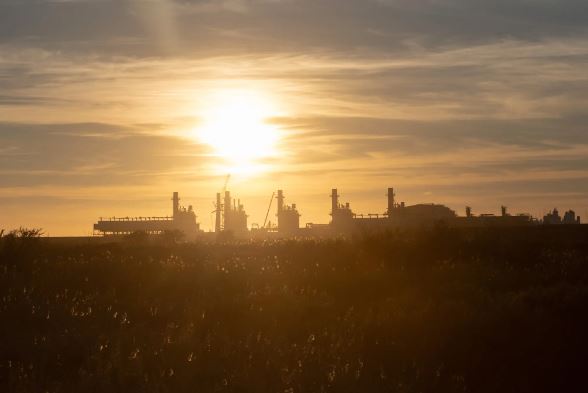In the midst of Louisiana’s marshy coastline, a relatively unknown company is pushing to construct a $10 billion liquefied natural gas (LNG) facility known as CP2, aiming to facilitate significant exports of LNG from the United States. Proponents argue that this terminal could boost the U.S. economy, reduce Europe’s dependence on Russian gas, and contribute to climate action by offering a cleaner alternative to coal.
However, a nationwide movement, comprising major environmental groups, scientists, and activists, is vehemently opposing the project, contending that CP2 would lock in decades of additional greenhouse gas emissions, exacerbating the primary driver of climate change. Beyond environmental concerns, opponents argue that the project would harm the local community and the delicate Gulf of Mexico ecosystem.
The fate of CP2 now rests in the hands of the Biden administration, which will decide whether the export terminal aligns with the “public interest.” This decision will force the administration to navigate a central contradiction in its energy policies – promoting a global shift away from fossil fuels while simultaneously exporting record amounts of LNG and potentially approving additional export facilities.
As President Biden focuses on climate action and courts young climate voters, he faces a delicate political balancing act. The administration aims to curb fossil fuel consumption globally but must also contend with rising gas prices, supply European allies with an alternative to Russian gas, and combat accusations from Republicans that it hinders American energy development.
The heart of the debate centers on Calcasieu Pass 2, the proposed export terminal set along a shipping channel connecting the Gulf of Mexico to Lake Charles, Louisiana. Venture Global LNG, a Virginia-based start-up, spearheads the project. The U.S. LNG export industry, a result of the hydraulic fracturing (fracking) boom that began two decades ago, has positioned the country as the world’s leading LNG exporter since 2016.
Supporters emphasize the strategic advantages of CP2, citing benefits such as enhancing Germany’s energy security amid interruptions in Russian gas supplies. They argue that such projects become crucial in the face of potential disruptions in the Middle East, underscoring the geopolitical importance of American LNG exports.
Recent analyses, such as one by Professor Robert Howarth from Cornell, suggest that emissions associated with exporting natural gas could surpass those of burning coal. Some activists claim that approving CP2 would result in emissions 20 times greater than those from the contentious Willow project, a major oil drilling development in Alaska approved by the Biden administration earlier this year.
The public outcry against CP2 has gained momentum through social media campaigns, petitions, and direct engagement with White House climate officials. Activists argue that the U.S. already possesses sufficient gas and export terminals, rendering additional facilities unnecessary.
While the Biden administration has faced criticism for approving the Willow project, opponents of CP2 hope for a different outcome. They are urging the administration to consider a broader assessment of emissions throughout the LNG production and transportation lifecycle, incorporating factors like methane leakage and shipping emissions.
As CP2 awaits various approvals, including air and water permits and the blessing of federal agencies, the Energy Department’s determination of its public interest status remains pivotal. Activists see this decision as an opportunity to not only block one infrastructure project but also potentially halt all new plans for U.S. LNG exports.
The complexities of balancing economic, geopolitical, and climate considerations underscore the challenges faced by the Biden administration. As the world grapples with transitioning away from fossil fuels, the CP2 decision becomes a litmus test for the administration’s commitment to climate goals and its ability to navigate conflicting priorities.

